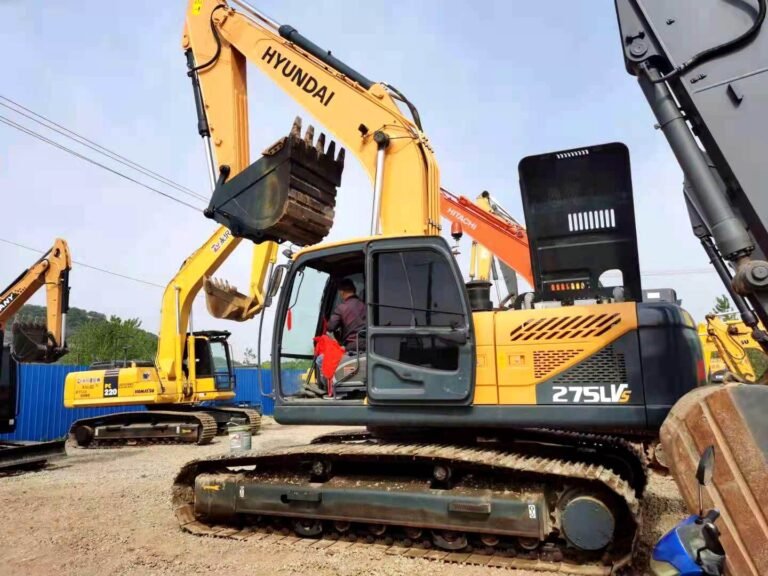Used Hyundai excavator
Contact us
- Mr. Stefan
- +86-15154636670
- Info@hixenmachinery.com
Need Help In Choosing The Right Used Excavator?
Looking for guidance on choosing the perfect machinery for your needs? Our team of professionals is ready to help you select the right equipment and ensure it meets your specific requirements and project needs. Trust us to provide you with the support you need to make informed business decisions.

Guide to Buying a Quality Used Excavator: Key Factors to Consider
This guide provides essential insights into purchasing a high-quality used excavator. It covers crucial factors to consider, including maintenance records, visual and structural inspections, operational testing, structural integrity, safety features, pricing, and financing options. Understanding the maintenance history and usage of the excavator is emphasized, along with thorough visual and structural inspections to ensure its condition. Operational testing is recommended to assess performance, while attention to safety features and structural integrity is essential for operator safety. Additionally, the guide discusses pricing considerations and explores financing options to make the purchase more manageable. By following these guidelines and working with reputable sellers, buyers can make informed decisions and ensure that their used excavator meets their project needs reliably.
Table of Contents
- Introduction
- Maintenance Records and Usage History
- Visual and Structural Inspection
- Operational Testing
- Finding a Trustworthy Seller
- Structural Integrity and Safety Features
- Price and Financing Optionsn
- Conclusion
Maintenance Records and Usage History
First and foremost, understanding the maintenance records of the excavator is crucial. A regularly maintained excavator typically has a longer lifespan and more reliable performance. Ask the seller for maintenance records, including servicing, repairs, and parts replacements history. This information can help you gauge whether the excavator has been well taken care of and if there are any signs of common issues.
Additionally, inquiring about the excavator’s usage history is essential. Find out if it has been used for heavy-duty work or under special conditions and whether there are any accident records, as this information can impact its structure and performance.
Visual and Structural Inspection
Before purchase, conducting a thorough visual and structural inspection is essential. Check the excavator’s appearance, including paint condition, exterior damage, and signs of corrosion. Inspect structural components such as the hydraulic system, bucket, arms, and tracks for any significant wear or damage.
Also, check the condition of the tires or track systems, as these components often experience higher rates of wear. If the excavator is equipped with tracks, ensure the tension of the tracks and the wear of the chains are within acceptable ranges.
Operational Testing
Before purchase, conducting a thorough visual and structural inspection is essential. Check the excavator’s appearance, including paint condition, exterior damage, and signs of corrosion. Inspect structural components such as the hydraulic system, bucket, arms, and tracks for any significant wear or damage.
Also, check the condition of the tires or track systems, as these components often experience higher rates of wear. If the excavator is equipped with tracks, ensure the tension of the tracks and the wear of the chains are within acceptable ranges.
Finding a Trustworthy Seller
Before purchase, conducting a thorough visual and structural inspection is essential. Check the excavator’s appearance, including paint condition, exterior damage, and signs of corrosion. Inspect structural components such as the hydraulic system, bucket, arms, and tracks for any significant wear or damage.
Also, check the condition of the tires or track systems, as these components often experience higher rates of wear. If the excavator is equipped with tracks, ensure the tension of the tracks and the wear of the chains are within acceptable ranges.
Structural Integrity and Safety Features
When considering the purchase of a used excavator, it’s crucial to assess its structural integrity and ensure the presence of essential safety features.
Structural Integrity: Inspecting the structural integrity of the excavator involves checking the frame and key components for signs of damage, wear, or repairs. Look for cracks, weld repairs, or any other indications of structural weakness that could compromise the machine’s stability and performance. A thorough inspection should cover the hydraulic system, bucket, arms, and tracks to ensure they are in good condition and free from any defects.
Safety Features: Confirming the presence of safety features is essential for operator protection and compliance with safety regulations. Two critical safety features to look for are Rollover Protection Structures (ROPS) and Falling Object Protection Structures (FOPS). ROPS provide a protective cage around the operator’s compartment to safeguard against rollover accidents. FOPS protect the operator from falling objects or debris by deflecting or absorbing impacts.
Inspect these safety features to ensure they are intact and functioning properly. Check for any signs of damage, corrosion, or missing components that could compromise their effectiveness. Additionally, verify that the excavator meets relevant safety standards and regulations for your region or industry.
By prioritizing structural integrity and safety features when evaluating a used excavator, you can ensure the machine is safe to operate and meets your requirements for reliability and performance.
Price and Financing Options
When it comes to purchasing a used excavator, considering the price and exploring financing options are crucial steps in making an informed decision.
Price Evaluation: Before finalizing the purchase, it’s important to thoroughly evaluate the price of the used excavator. This involves comparing the asking price with the machine’s condition, maintenance history, and performance. It’s essential to ensure that the price accurately reflects the value of the excavator and is competitive compared to similar models on the market. Additionally, consider any additional features or attachments included in the price, as these can affect the overall value proposition.
Financing Options: Exploring financing options can help make the purchase of a used excavator more manageable for your budget. Financing allows you to spread out the cost of the excavator over time, rather than paying the full amount upfront. Common financing options include:
Loans: Obtaining a loan from a bank or financial institution allows you to borrow the funds needed to purchase the excavator. You’ll repay the loan over a set period, typically with fixed monthly payments and interest rates.
Leasing: Leasing the excavator involves renting it for a predetermined period, with the option to purchase it at the end of the lease term. Leasing can offer lower monthly payments compared to loans and may provide tax benefits for businesses.
Dealer Financing: Some dealerships may offer financing options directly to buyers, often with competitive rates and flexible terms. Dealer financing can streamline the purchasing process and may include special promotions or incentives.
Conclusion
In summary, purchasing a used excavator requires careful consideration of several key factors to ensure that it meets your project needs and provides reliable performance. First, assessing the maintenance records and usage history provides insight into the machine’s care and any potential issues it may have had in the past. Second, conducting a thorough visual and structural inspection helps identify any visible wear, damage, or structural weaknesses that could affect the excavator’s performance. Third, operational testing allows you to assess the machine’s working performance and functionality. Fourth, confirming the presence of safety features such as ROPS and FOPS is essential for operator safety. Finally, considering the price in relation to the machine’s condition and exploring financing options can help make the purchase more manageable. By following these guidelines and working with reputable sellers, you can make an informed decision and ensure that your used excavator meets your project requirements reliably.
Send Your Inquiry Now
Get a Rapid Quote for Your Project Needs
Receive a Quick Quote or Share Your Requirements, and We’ll Respond Promptly!







